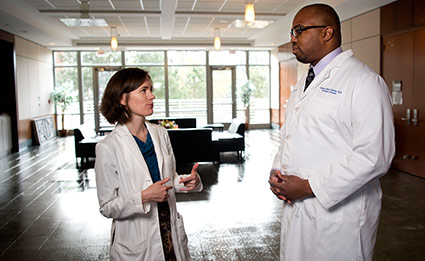Tracking the Spread of HIV's Drug Resistance in NC

In the 1990s, a person who became infected with the human immunodeficiency virus (HIV) could progress to full-blown AIDS within a few years' time. While there is still no vaccine or cure available for HIV, with early diagnosis and antiretroviral therapy (ART), infected individuals today can expect to live a long and relatively healthy life. And yet, an estimated 15 to 20 percent of people newly infected with HIV already carry a strain with mutations that allow the virus to resist some treatment options, according to Ann Dennis, MD, an Assistant Professor of Infectious Diseases at UNC.
Dennis has teamed up with Nwora Lance Okeke, MD, MPH, a Medical Instructor in Infectious Diseases at Duke, to track the spread of these resistant mutations across North Carolina over time.
Preparing for Unintended Consequences
HIV is notorious for its ability to evolve rapidly. As a result, the widespread availability of ART has led, over time, to unintended consequences: the evolution of mutations that allow HIV to resist treatment, particularly with medications that have been in use for many years.
According to Dennis, people can now acquire drug-resistant strains of HIV in two ways. In some people, the virus may develop mutations that eventually limit the usefulness of a particular drug they’ve taken over time. But, increasingly, those resistant forms of HIV are spreading from one person to another.
Since 2007, doctors in the U.S. have made it part of routine care to genetically test the viruses infecting a patient as part of their initial diagnosis in order to select a drug that is mostly likely to work. Now, with funding support from the Clinical and Translational Science Awards (CTSAs) at Duke and UNC, Dennis and Okeke plan to use those vast stores of genetic information on HIV strains infecting people in North Carolina to track the spread of those resistance mutations across the state over time.
Their hope is that understanding the spread of existing resistance mutations will help doctors to predict and better prepare for the development and spread of novel resistance mutations to HIV treatments as they arise.
“We project in the future as more people are on these newer medications, we’ll begin to see the same problem we have now in older drugs,” Okeke said. “The purpose of our study is to have the infrastructure in place that allows us to track how transmitted mutations are moving on the population level and to predict when we can expect to run into problems with resistance.”

Teaming Up for Data
Dennis and Okeke say that the collaboration between Duke and UNC presents a perfect opportunity to explore the evolution and migration of drug-resistant HIV strains. While larger cities may serve more patients, they also tend to have highly decentralized health systems with many clinics, they explain. In North Carolina, by contrast, relatively few clinics provide HIV care. By teaming up across institutional boundaries, Okeke and Dennis have ready access to large amounts of genetic data on HIV circulating within the state representing thousands of patients -- complete with their detailed medical information.
The researchers will apply an approach known as phylogenetic analysis to make genetic comparisons amongst HIV strains. This will help them understand how HIV strains circulating within the state are related to one another and how they have spread from one person to the next.
Their approach will provide insight into the evolution of the virus. They’re also curious to learn how long resistance mutations to older treatments persist, even after those medications have fallen out of favor. They also hope to discover what factors influence the likelihood that a person may become infected with a drug resistant HIV strain.
A Framework for Action
Dennis and Okeke say the results of their analysis will provide a pivotal framework for the development of a comprehensive statewide surveillance strategy for transmitted drug resistance. That’s particularly important now as scientists and doctors anticipate the emergence of new forms of ART resistance. If and when those new forms of resistance surface, they’ll be ready.
While the researchers are focusing their attention locally to start, Dennis says the findings might also be applied to people living in other parts of the Southeast and beyond. Their insights might even hold important lessons for HIV treatment in other parts of the globe, including sub-Saharan Africa, where older drugs continue to see more use.
“We’re really excited for any opportunity for collaboration especially on a disease with such huge public health implications,” Okeke said. “We’re excited to be on the forefront and appreciate the CTSAs for giving us this opportunity.”
Okeke and Dennis represent one of four teams to receive collaborative grants from the Duke CTSA and the CTSA at UNC-Chapel Hill this year. These Duke/UNC CTSA Collaborative Pilot Program awards are part of an effort to promote inter-institutional collaborations that can turn basic scientific discoveries into advances in patient care.
UNC and Duke are both members of the Clinical and Translational Awards (CTSA) Program, a national consortium created to improve the way biomedical research is conducted across the country. The CTSA program is funded by the National Center for Advancing Translational Sciences (NCATS), part of the National Institutes of Health (NIH).
Editor's note: This is the second article in a series exploring four Duke-UNC collaborations funded in 2016 through the Clinical and Translational Science Awards (CTSAs) at Duke and UNC.
This project is supported by the National Center for Advancing Translational Sciences (NCATS), National Institutes of Health, through Grant Award Number UL1TR00111 and UL1TR001117. The content is solely the responsibility of the authors and does not necessarily represent the official views of the NIH.
- Created on .